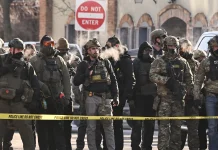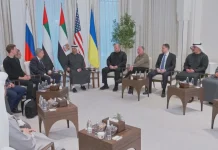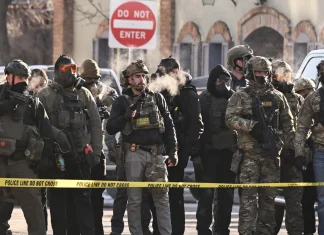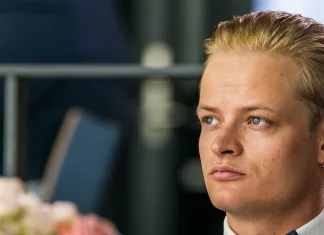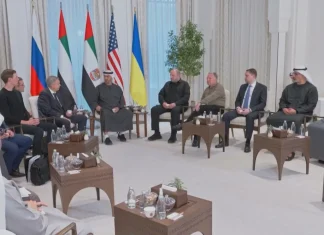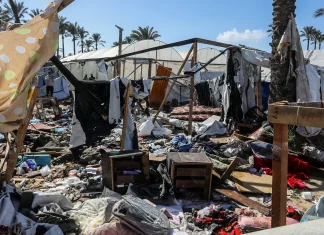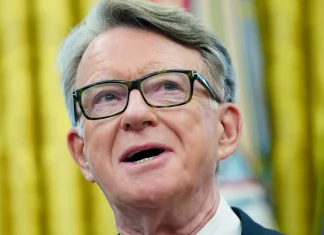
A City on Edge: Tbilisi’s Square Became a Mirror
The air in Tbilisi on election day tasted metallic — not from the coffee or the sulfur baths, but from tear gas. It clung to clothes, to the crisp autumn sky, and to the conversations that had been building for a year. For a country that once read its future in the rhythms of church bells and polyphonic songs, the sound that cut through Freedom Square was the shouted cadence of protest and counter-accusation.
Georgia’s municipal elections were supposed to be routine: local ballots, local officials. Instead they arrived as a referendum on the state of the nation — and on whether a struggling democracy can survive a winter of political repression, media raids and mass arrests.
What Unfolded on Election Day
By midday, tens of thousands had converged on Freedom Square after opposition leaders called for a “last-chance” protest to “save Georgian democracy.” Flags snapped in the breeze. Vendors sold warming cups of chai and toasted bread. Children, pulled along by parents, watched adults chant and wave placards.
As the day darkened, a splinter of the crowd surged toward the presidential palace. Police met them with water cannon and, later, clouds of tear gas. Videos shared across social platforms showed lines of uniformed riot officers forming human barricades, while others captured the stunned faces of medics treating the coughing and the dazed.
“We came because there’s no other place to go,” said Eka, a 42-year-old teacher whose voice trembled between anger and fear. “If you lose the right to speak, what are you left with?”
Official Narrative: Coup Attempt and Weapons Cache
The government framed the day as an “attempted coup.” Prime Minister Irakli Kobakhidze told reporters that organizers had tried to violently seize the palace and that “no one will go unpunished.” The interior ministry said five protest leaders were arrested and face up to nine years in prison. The State Security Service (SSS) reported finding a cache of firearms, ammunition and explosives in a forest near Tbilisi, alleging the weapons were intended for “subversive acts” on election day — and that they were procured on the instructions of a Georgian man fighting with Ukrainian forces.
“We uncovered a real plan to destabilize the country,” a senior security official, speaking on condition of anonymity, said. “This was not spontaneous. It involved material preparations.”
Critics, however, smell a different scent: opportunity. “Labeling protests as coups has become a familiar playbook,” said Maia Arveladze, a civil rights lawyer in Tbilisi. “It justifies draconian responses and criminalizes dissent.”
Arrests, Health, and a Vanishing Public Sphere
Among those detained was Paata Burchuladze, a world-renowned opera singer turned activist, who had read a declaration on the podium calling the government “illegitimate” and urging power back to the people. Local reporting said Burchuladze, 70, was detained while in the intensive care unit of a Tbilisi hospital where he had been treated for a heart attack — a detail that deepened public unease.
Rights groups say roughly 60 people — including politicians, journalists and activists — have been jailed over the past year. Georgian Dream, in power since 2012, swept municipal council majorities and claimed landslide mayoral wins across the country, the central election commission reported. Most major opposition parties boycotted the vote, arguing it was neither free nor fair.
“The hollowing out of institutions is not just a Georgian story,” noted Thomas Keller, a democracy specialist with a Europe-focused think tank. “We’re seeing an unsettling global pattern: elected parties consolidate power, weaken checks and balances, and then use security rhetoric to silence rivals.”
Numbers That Matter
- Population: roughly 4 million people live in Georgia.
- Government in power: Georgian Dream since 2012.
- Survey snapshot: one recent poll by the Institute of Social Studies and Analysis put Georgian Dream’s approval at about 36% versus 54% for opposition groups.
- Detentions over the past year: rights groups estimate around 60 people jailed.
Voices from the Square
The human stories are the ones that linger. An elderly woman named Nino clasped a faded Orthodox rosary and said she feared for the future of her grandchildren. “We used to sing at family gatherings,” she said quietly. “Now our children whisper.”
Opposition activists called it a moment of moral clarity. “People are not asking for chaos,” said Giorgi, a 29-year-old IT worker. “We’re asking for the basics — transparent institutions, independent courts, a free press.”
But in the villages and small towns where Georgian Dream’s message about “stability” resonates, a different calculus prevails. “We don’t want war,” said Luka, a farmer outside Zugdidi. “We have seen what unrest brings. We vote for jobs and peace, not slogans.” Analysts say that message, amplified by targeted disinformation, helps explain the party’s grip in rural areas.
Where Georgia Stands in the World
This is not just a national drama. Georgia’s rocky relationship with Brussels — its path to EU membership effectively frozen after last year’s disputed parliamentary vote — makes the stakes geopolitical. Accusations that foreign intelligence services are behind unrest have been hurled by the government. Western diplomats have warned against crackdowns and urged reforms. Russia watches closely from across the borders and the Black Sea, its influence still a shadow over Georgian politics.
“Georgia sits at a crossroads — geographically and politically,” said Ana Pereira, an EU diplomat. “If democratic backsliding continues, it will be more than a regional issue. It will be a blow to the European project of stabilizing its neighborhood.”
Questions for the Reader
What do you make of a government that promises “stability” at the cost of dissent? Can European integration be a carrot if the road narrows with each protest? And when does the rhetoric of security become a pretext for silencing opposition?
Looking Forward
For now, Tbilisi breathes uneasily. The municipal ballots have been tallied, but the contest — over narrative, legitimacy, and the future orientation of the country — is far from settled. As Georgia wrestles with the choices before it, citizens, exiles, and onlookers abroad will be watching to see whether institutions hold or whether fear becomes the new normal.
“We are not asking for perfection,” Eka the teacher said, fingers still stained with the ink voters dip in their ballots. “We are asking for the right to try.”
In the coming months, expect legal battles, more protests, and an international chorus calling for restraint. But whether that chorus will be loud enough to reshape the domestic calculus remains a question only time — and the people of Georgia — can answer.


